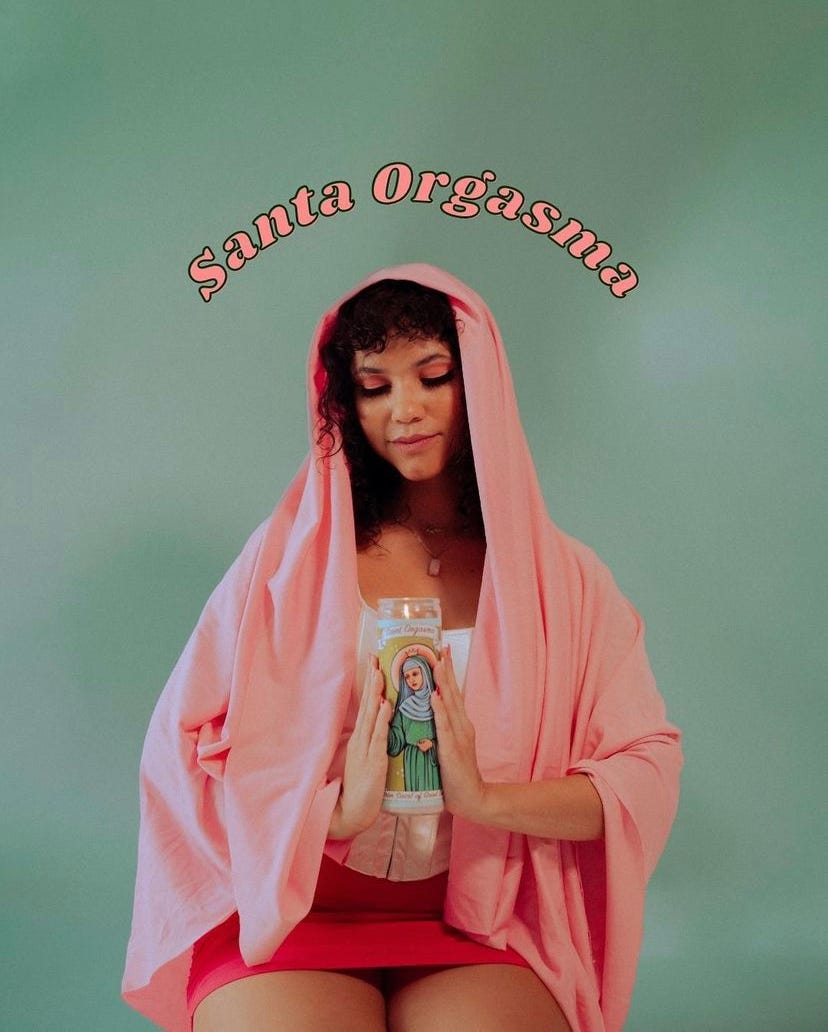On pleasure as revolution: with Larissa Gloriel
Puerto Rican sexuality and pleasure coach takes us through her journey deconstructing love, and leaves us some tips to integrate pleasure in our lives.
Today’s essay is about pleasure as a revolutionary act. I talk to Larissa Gloriel, a sexuality and pleasure coach from Puerto Rico. Her work takes sexuality, pleasure, and love, as interrelated elements that we can work on and deconstruct from a place of joy and kindness. At the end of this essay, find two rituals inspired by her practice, one for pleasure, and one for deconstructing love.
Larissa Gloriel has been activating, creating content and educating about integral sexuality in a creative, fun and colloquial way for five years. With the aim of breaking taboos and misinformation on sexual issues to promote healthy lives full of pleasures.
There is an audio version of this essay which I had a lot of fun making, I have a new mic, and an incredible playlist to accompany it 🔥
Enjoy!
“Godere” is a word in Italian that has no exact translation in English. I would say the closest concept to it is to enjoy orgasmically. We use it in many contexts: from sex to eating a delicious plate of pasta, to being in the sun when it hits you at the perfect angle. This word is extremely old and derives from Latin, and despite there being no proof on the internet, I wonder if the word “God” has roots in it.
So, in theory, we Italians grow up with the concept of pleasure all around us, and I would say that when it comes to food, recreation and life’s pleasures we really do know how to enjoy life. When it comes to sexual pleasure, things are different. Catholic influence has made sexual pleasure something that often carries shame. For me, my relationship with my own sexual pleasure began in the years I was romantically alone, and I felt I had the space and time, in my own privacy, to experiment with it. Before that, most of my pleasure had been overshadowed by a sense of embarrassment, and dependent on my partners. It’s not that my family was particularly reserved when it came to this, on the contrary, my mother left me to do my thing when I rubbed my thighs against the sofa as a child and felt the first taste of pleasure down there. I had no idea what I was doing, but I liked it, and I wasn’t shamed for it. When I asked her years later, laughing at little me riding a sofa arm, she told me that she wanted me to have a healthy relationship with my sexuality and pleasure, and years later I would discover why, but that’s for another day.
I was lucky enough to speak to my mother and my friends about pleasure, but never to anyone older. Today I am speaking to someone who did. When Larissa Gloriel asked her grandmother about masturbation, her grandmother answered honestly and tenderly: “I am 73 years old and I have never touched myself,” she said. “I come from an evangelical family where everything was a sin. At church, they told us that God was watching us at all times, so it never occurred to me to explore myself”. This conversation was published in a book by Larissa and her business partner Nazareth dos Santos called Sola Me Gusto a project that sheds light on female masturbation and self-love. I met Larissa at the book opening five years ago. It was in a sex shop.
Today, Larissa lives in her home in Puerto Rico, and she guides her clients to explore love, pleasure, and sexuality in a holistic way, deconstructing the patriarchal and capitalist ways in which we have learned Love. “For almost five years, I was really angry with love,” she tells me, “I had been told that a prince would come, sweep me off my feet, and save me. And I’m a hopeless romantic, so I believed it. When I became a feminist I felt ashamed to say this for a lot of years.” Her vulnerability seems tender and pairs wonderfully with her boldness. When she speaks, you want to listen; she dances laughs at herself and delivers wisdom with colour. “I was really mad.” she says with fervour “Oh my God! I have been cheated on all my life. Because love doesn’t come like a miracle, it is something that you take action on, something that you build, but first within yourself.” Feminism helped her understand that, she says.
Our society is in between two currents when it comes to love. Patriarchy pushes a hierarchical type of love that involves power dynamics and is problematically heteronormative. Whilst under capitalism, material objects become conversation pieces within couples who can’t truly and openly communicate. I send you flowers because I messed up, I give you a diamond ring to show you my commitment. Consumerist behaviours replaced words and caresses, and we lost track of that.
Looking at Love from a patriarchal lens also often centres the woman as the only one preoccupied with love “And this is really problematic” Larissa tells me “because if you are heteronormative and a cis woman who likes men, then you’re engaging with someone that is not open to deconstructing love or talking about it. And so when feminism comes to play, running from Love has often been seen as a revolutionary act. But this is really not the case”. she concludes.
Seeing these narratives at play, Larissa decided to tackle love from a pleasure perspective. “To deconstruct love, the answer is not to run away from it, but look at love and identify how you feel when you feel love. Ask yourself: how can I express love? What is my love language?” she says “And when you start connecting all that there is about love, you can start transforming it into pleasure,” says Larissa.
“I see masturbation as something to check on myself. For me, it is that feeling of knowing that this is my body. This is my pleasure, I'm still in control of my life,” she tells me. A practice of pleasure is therefore a statement of autonomy of what one can do or not do with one’s own body, but it is the way we connect with it and the intention we put into pleasure that is what we need to decondition.
“When you start realising what society hides from us in terms of sex,” she says, “or if you enter into a more sex-positive mindset, looking at history, science, you notice that usually masturbation in particular, is one of the most taboo topics,” she says. When I ask why, she tells me that it is because it is something that you do with yourself, and society doesn't get any benefit from it.
“Now that there are vibrators society is starting to embrace masturbation a little more because they can take some benefit from it,” she says matter-of-factly. It makes me reflect that therefore capitalism, love, and pleasure are deeply connected and that we have a lot of deconditioning to do.
Deconditioning can start from small gestures such as making a ritual out of taking coffee in the morning. Making it sensorial, like these essays, is also a pleasure to practice.
“In times of crisis, I touch myself to remind myself that I am alive”
Discovering yourself implies discovering your context, she tells me. “Being a Latina, and growing up in Puerto Rico, which is still a colony, has had a really big impact on our bodies and our sexuality because when you grow up in a place without a clear political identity, how can you live a powerful and secure sexuality?” she says. “Our bodies experience this kind of disconnection and confusion,” she continues. Love, pleasure, and territory are dancing as she weaves this last thought of our conversation. “And also when you mix it with the social context of land or territory, which is colonised, then you start questioning. If I don't have that clarity, how can I have clarity with my life with my sexuality with my autonomy?” she tells me. And here she shares some of the ways in which her work also guides folks to deconstruct these kinds of conditionings. She tells me that connecting and seeing the power around sexuality, pleasure and love has been a life-changing opportunity for her because it made her more connected with what she wants.
“I understand more of what is happening.” she says, “I know that when I enter a place, I come with a lot of labels. I know that my body, my accent, my way of looking my skin colour all have an impact on how I am perceived. And owning it and being sure about what I like, what I don't like, how I view myself, how I connect with my sexuality, it’s incredibly powerful." I take a moment to take in the power of these words and connect to the feeling I had when feminism came into my life and introduced me to a version of love that centres agency, power, and compassion. I am proud of that 28-year-old Virginia that questioned things and searched for her own pleasure as a tool to decondition, and I want to see that woman more often.
“In times of crisis, I touch myself to remind myself that I am alive”. These words were written by Larissa almost a year ago, they made me think of how a pleasure practice, therefore, becomes a poetic antidote, one where we remind ourselves that despite the oppressions we are here, that our body is here, that despite the killings, beatings and abuses, it is still alive. To know and touch your body is a sacred act of rebellion, we must not forget that.
Below, I leave you with two rituals that Larissa created especially for this conversation. The first is a pleasure ritual that starts with regaining a connection with our pleasure. It has journal prompts and a ritual. The second is a ritual to deconstruct our idea of Love, I would highly recommend it if you need to heal from a past relationship or you feel that something from the past is still lingering ❤️⚡️
Oh and obviously the playlist, which I made with love and pleasure in mind 🔥🔥🔥🔥🔥
Join the waiting list to get a session with Larissa here
Keep reading with a 7-day free trial
Subscribe to Waves to keep reading this post and get 7 days of free access to the full post archives.






